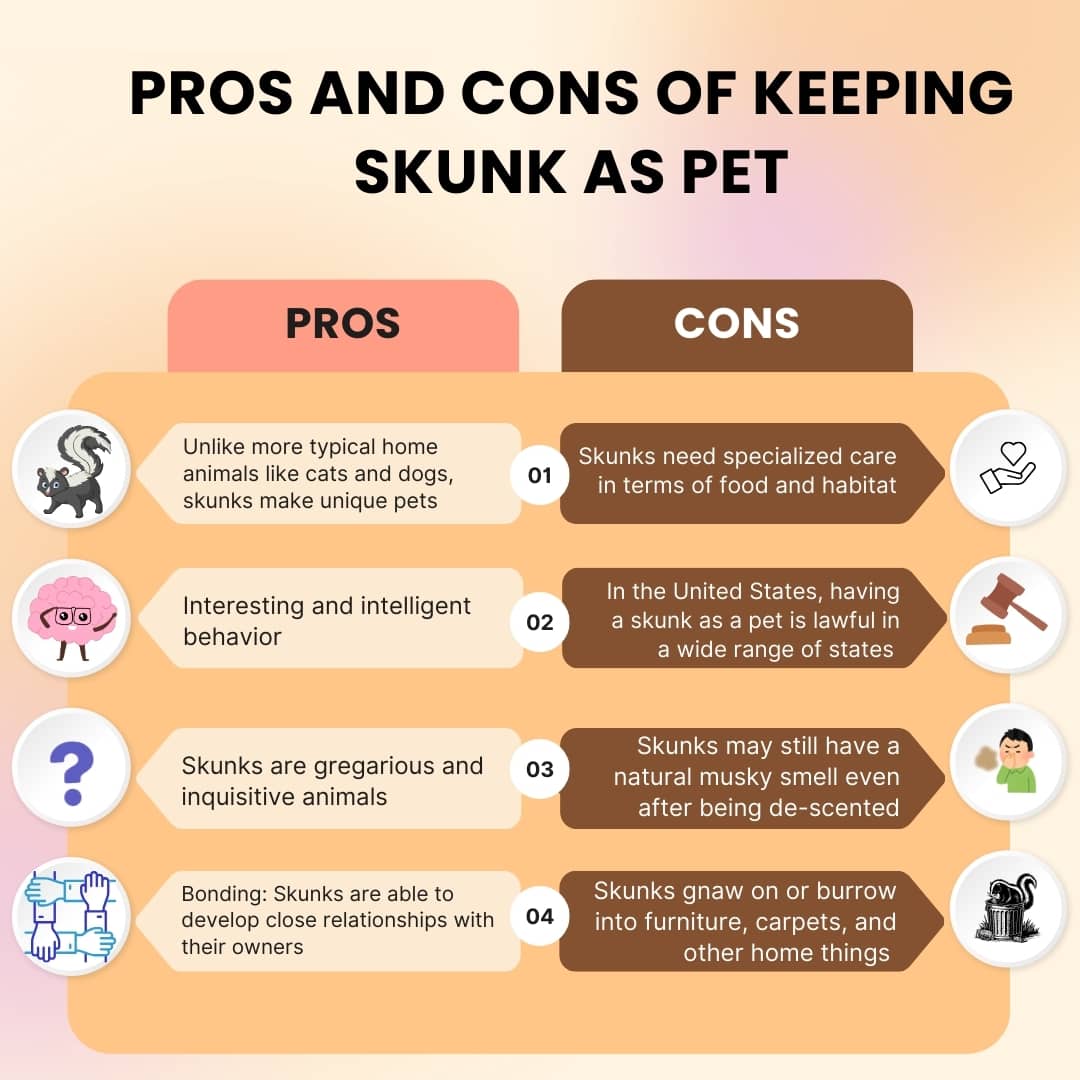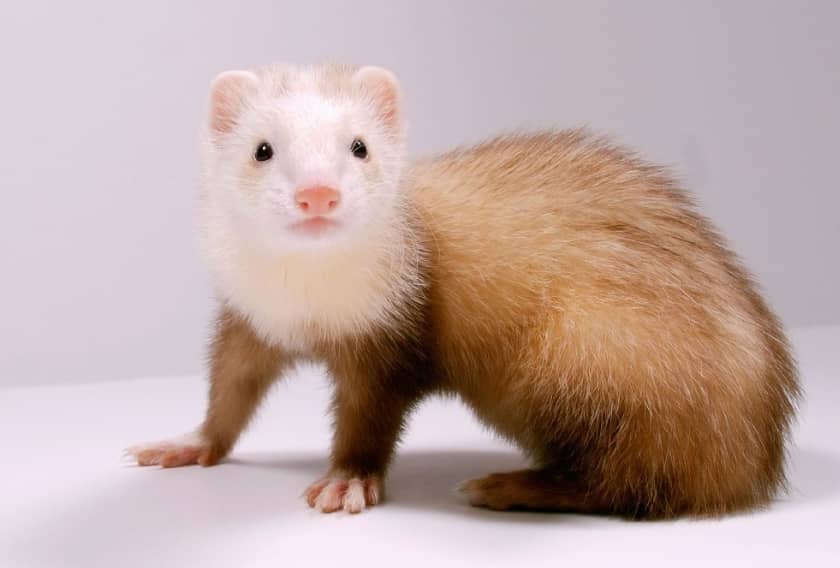Skunks are mammals from the Mephitidae family, known for their distinctive black-and-white coloration. Skunks have a playful and curious nature and are kept as exotic pets in some parts of the United States.

They are known to have a unique ability to spray a chemical with a foul odor to their predators as their defense mechanism. They have special glands that create an oily substance which is known as Skunk musk.
The Striped Skunk (Mephitis mephitis) is the most commonly recognized in North America to be kept as a pet. It has shining black fur with either a thick white stripe, two thinner white stripes, or broken white stripes running from its forehead to its tail on its back making a distinctive “V” shape.
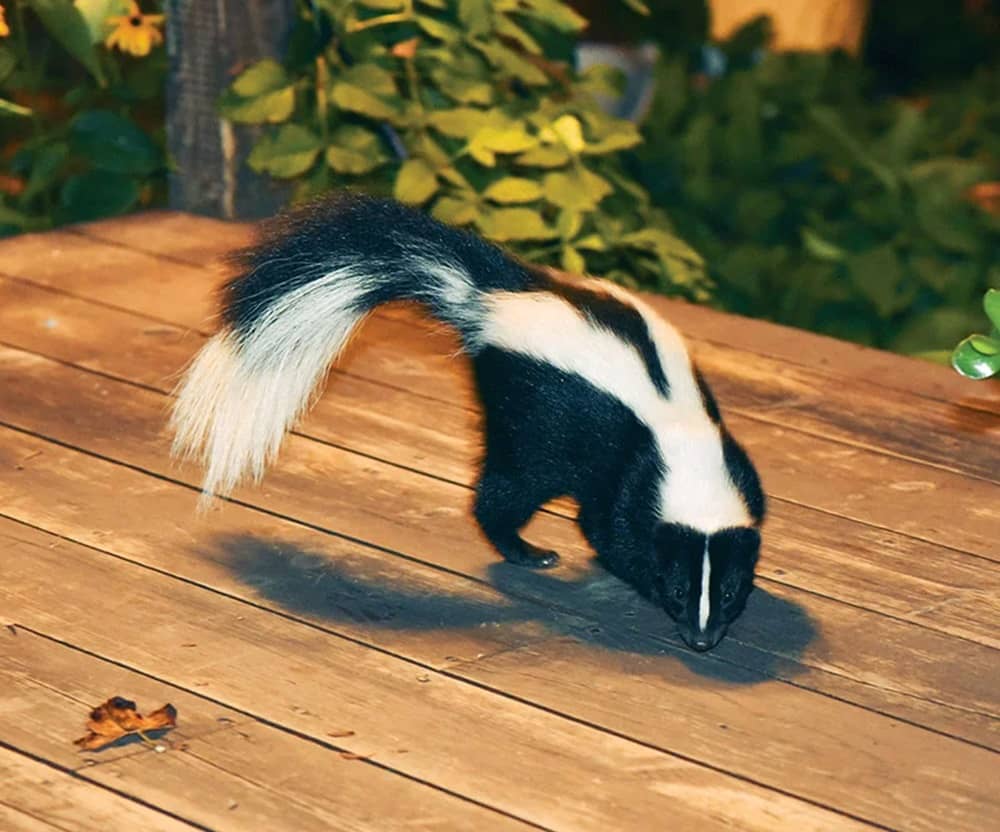
Skunks are fascinating creatures with a unique place in the animal kingdom due to their distinct appearance and formidable defense mechanisms. Skunks are native to America and farmers used to keep them for killing pests such as rodents.
They are an important part of their ecosystems, helping to control insect populations and clean up carrion. Nowadays, they are kept as pets, and as animals in the show. They are nocturnal creatures but learn to adapt to the schedules of humans.
It is kept in Canada, Germany, Italy the Netherlands, Poland, and some states of the United States. The scent glands are usually removed surgically in captive breeds for their calm disposition although it is a controversial matter. According to some experts, spraying is a defense mechanism for Skunks, and stripping away is not good for it. However, this practice has been banned in the United Kingdom since 2006.
Size Information and Lifespan
It has a squat body with strong claws for digging. It is 20 to 31 inches long including its bushy tails and weighs up to 15 pounds. The lifespan of a skunk in the wild is 3 to 4 years but in captivity, it is much longer. It lives nearly 10 to 15 years.
Male Vs. Female Skunks
Understanding the differences between male and female skunks is crucial for potential pet owners. Male skunks are commonly bigger and more strong than females. They can be more regional and could show a more prevailing way of behaving.
The females for the most part are modest and frequently less forceful. They might be more tender and simpler to deal with.
Behavior and Temperament
Skunks are known for their curious and playful nature. They are so curious that they tend to open drawers, cupboards, and even refrigerators in your house. At times they have to pay for this curious nature as they may stuck in the recliners or any other machinery kind of stuff in your house. Skunks are sensitive and intelligent creatures. The behavior of all skunks is not the same which means each skunk has a unique temperament.
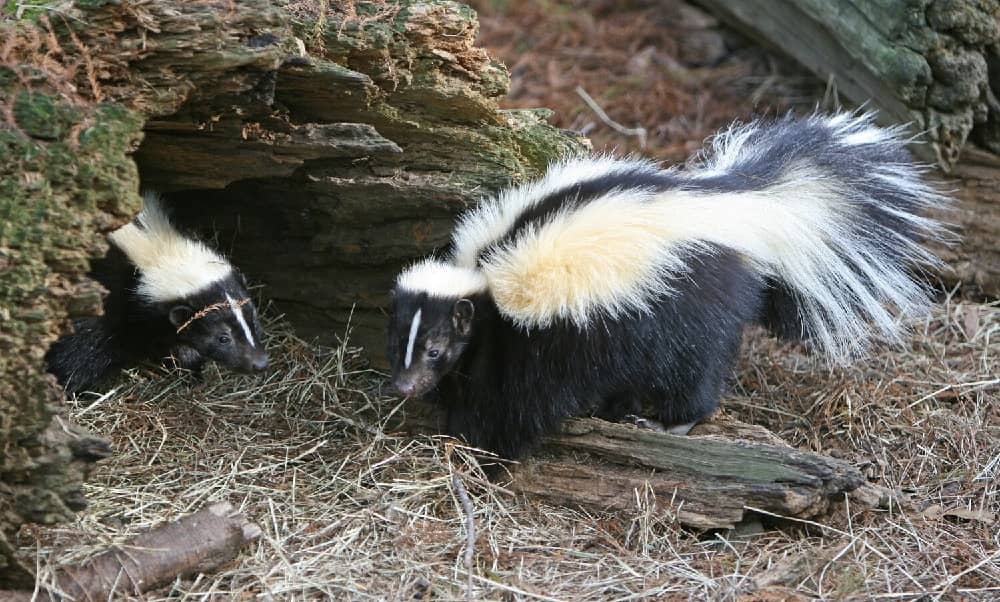
They require monitoring or a very well-designed room that is “skunk-proofed,” as they may be rowdy and have no regard for “house manners.” This sets them apart from other domesticated animals. Skunks lack the homing instincts of dogs and cats, therefore it’s crucial that they don’t find their way outside the house. Moreover, it’s doubtful that they will come back.
They are nocturnal animals, meaning they are most active during the night. Skunks can form strong bonds with their owners and are generally friendly, though they can be shy or nervous around strangers. This bonding should start when you get a young skunk and you try to understand its nature. These creatures learn to be comfortable and can be playful and cuddly when handled by people.
How to Care for a Pet Skunk?
While they can make interesting pets, it’s important to understand their needs and behaviors fully. Skunks require a lot of care in terms of house requirements, complexities in diet, interaction with other animals, and legalities in your state.
Housing Requirements
Skunks need a safe, secure, and enriching environment. A large, multi-level cage is ideal, but they should also have access to roam around the house under supervision as they don’t like much to stay in a cage.
The arboreal cages are preferred with secured corners as skunks are tough-minded and persistent diggers to create space for escaping. Therefore it would be better if you spare a room with a pet bed, lots of toys and a litter box.

You should also ensure that there are no small spaces in which they can squeeze in. As Skunks are so curious that they will explore every corner of your house, open drawers, and may chew wires, keeping them in a separate room is a great option. They are messy creatures so you can keep that mess in one corner of your house by limiting their access to every corner of your house.
Specific Substrate Needs
A pet bed that is used for small dogs or cats with a bedding of fleece blankets can be set for your skunk to give it a cozy and comfortable space. Skunks prefer to use corners of the room to ease themselves therefore you should keep a shallow litter box in the corner of the room. You can create a litter box with paper-based or wood pellet litter for your pet skunk.
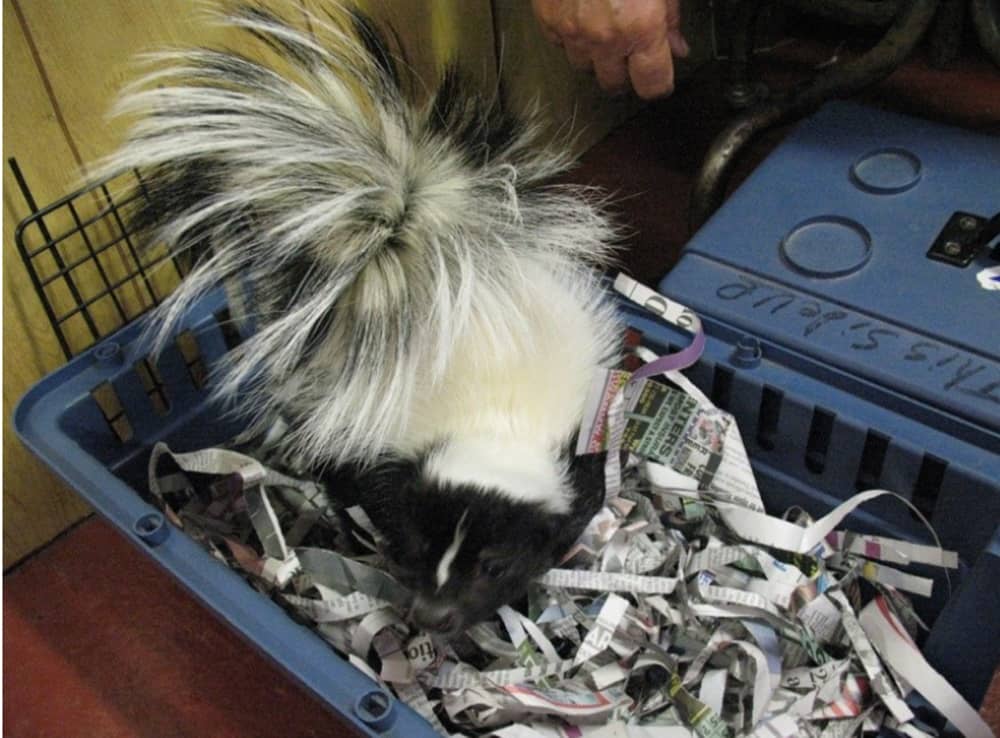
What Does a Skunk Eat or Drink?
Skunks are omnivores and need a balanced diet to maintain good health. In the wild, it primarily eats rodents, lizards, frogs, snakes, birds, and moles. But in captivity, it can be fed cooked chicken, eggs, fish, or feeder insects to meet its daily protein requirements.
Apart from lean protein, it can be given fresh, cooked, and thawed frozen vegetables, yogurt, cereals, nuts, cooked grains, and small amounts of dog food. You can start the diet with a nutritious, well-balanced kibble made specifically for skunks. Avoiding food items deemed harmful or unhealthy for dogs is a good idea.
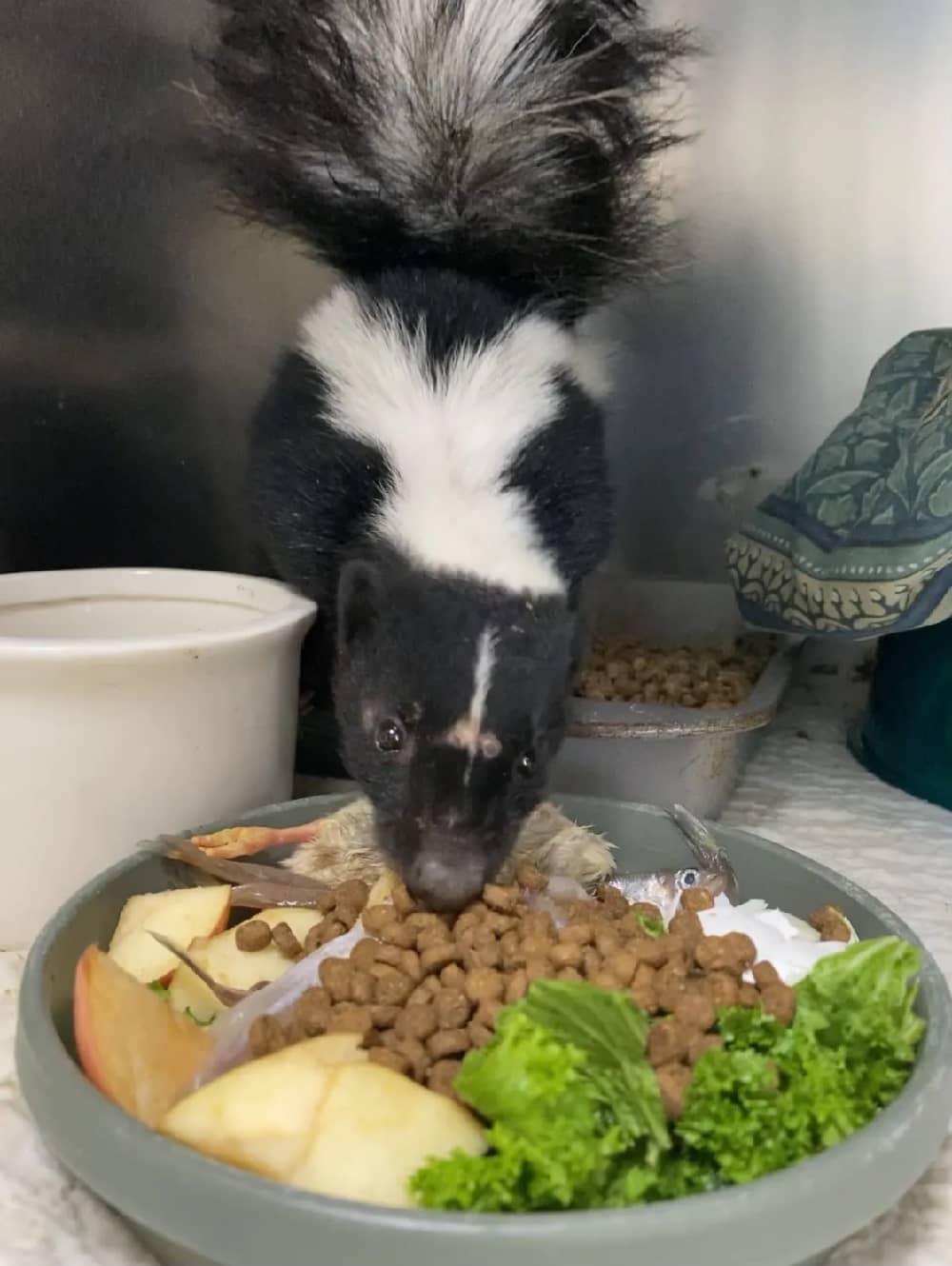
Fruits like apples and berries can be given as a treat to them. The adult skunks need to be fed twice a day but young ones need to be fed more frequently. The amount of food to be given to your pet should be guided by your veterinarian. You should keep a dish filled with water inside their room though they may or may not drink.
Exercise
Skunks need moderate exercise daily to maintain their well-being. It’s crucial to provide them with daily opportunities for supervised playtime outside of their cage so they can explore, dig, and take part in exciting activities.
This lessens the risk of obesity and boredom, both of which can result in behavioral problems. Interactive games and toys can also improve their mental and physical health therefore you should keep some toys in their room.
Grooming
When it comes to grooming, skunks need less grooming practices. However, they need weekly brushing of their hair. On a regular basis, you should trim their nail, clean their ears, and brush their teeth. Bathing can help them keep clean. You can use a mild shampoo for bathing your skunk.
Handling a Skunk
To ensure safety and foster confidence, handling a skunk calls for cautious and delicate methods. You should proceed gently to prevent surprising the skunk.
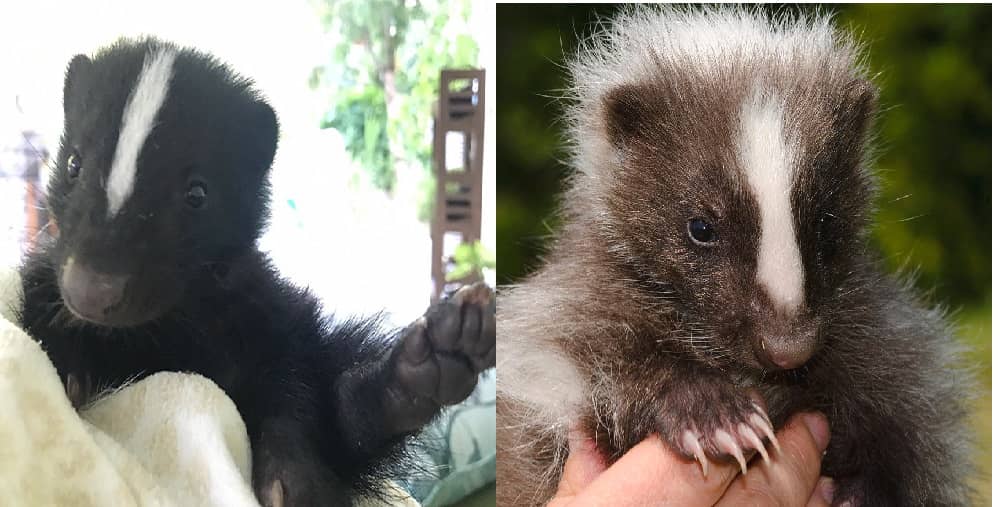
When picking it up, move slowly and steadily while providing whole-body support.
To get skunks more accustomed to social interaction, begin interacting with them at an early age. In this way, they will grow with an affectionate and cuddly personality. You should give them time to become used to being held, and keep an eye out for any indications of stress or pain. You and your skunk can develop a closer relationship with consistent, gentle handling.
Ethics and Legality
Before getting a skunk as a pet, it’s critical to comprehend the following ethical and legal issues where you live. Always ensure that keeping a skunk is legal in your area and that you are prepared for the commitment of caring for an exotic pet.
Keeping a skunk as a pet is strictly prohibited in some states and permitted in others. You will need to verify local regulations at all times and get the required permits accordingly. Moreover, you will have to act according to the norms that indicate what you are expected to do when your skunk interacts with other animals or bites a human.
It is legal in certain states such as Florida, Indiana, Iowa, Kentucky, New Mexico, New Jersey, and Ohio. However, Alabama, California, Connecticut, Idaho, and Washington DC do not allow you to keep a skunk in your home.
Being aware of the time and effort needed to take care of an exotic pet is important, as is making sure skunks are bred and grown in good and ethical circumstances. Moreover, providing a proper habitat, a well-balanced diet, and a playful environment to your pet is of paramount importance.
Things to consider
Skunks are not aggressive if they are socialized from the beginning, but if they bite someone then there can be serious repercussions. There is no specialized vaccination for domestic skunks and Rabies can be spread through their saliva. The Skunks are kept indoors and away from any wild animals to keep them safe from being infected. It is mandatory to report a skunk bite and it could result in your pet being taken away from you. Some pet Skunks have even been euthanized after biting.
Common Health Issues in Skunk Pet
- Metabolic Bone Disease: Due to a lack of vitamin D and calcium, your skunk can have these issues. It is often observed in young skunks.
- Obesity: It is often due to overfeeding and lack of exercise.
- Dental Problems: Regular checkups are necessary to prevent issues.
- Nutritional Deficiencies: Ensure a balanced diet to avoid deficiencies.
- Diabetes: They may develop diabetes due to sugary intake in their diet. This happens when the body either produces insufficient amounts of insulin or uses it improperly. It causes blood sugar to rise.
A proper diet can help in reducing the chances of developing these problems. Moreover, other behavioral issues such as aggression can be avoided by spying or neutering the skunks at the age of 4 months. Additionally, pet owners can lower their risk of hormonal tumors by using this basic procedure. The scent glands are also removed at this stage or younger age to make it more compatible to be kept as a pet.
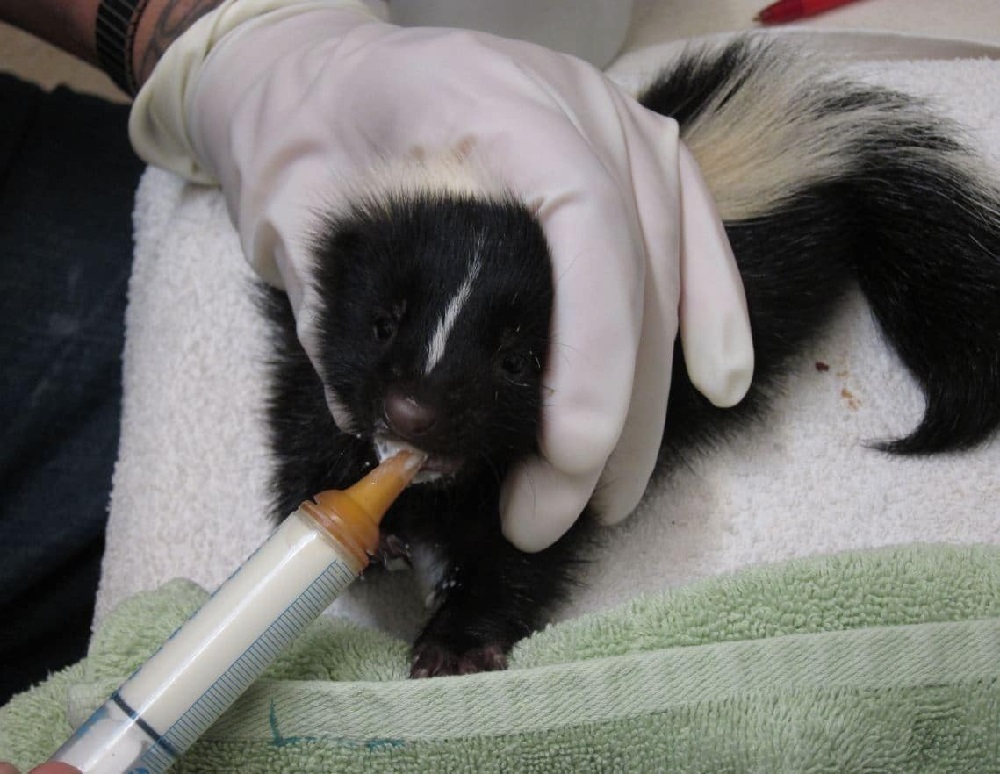
Signs of Ill Health
You should look for the following signs that need to be addressed :
- Lethargy
- Loss of appetite
- Unusual stool
- Labored Breathing
- Excessive scratching
- Erythema of skin around the eyes
These are some of the symptoms to check for healthy well-being for your skunk. These indicators can be a real help in providing medical aid to your skunk in time.
Reproduction and Breeding
Reproduction and breeding of skunks typically occur in early spring. The gestation period lasts around 66 days, resulting in the birth of a litter of 4 to 7 kits. Kits are dependent on their mother for warmth and sustenance since they are born blind and deaf.
At about three weeks of age, they open their eyes, and by two months, they are weaned off of their mother’s milk.
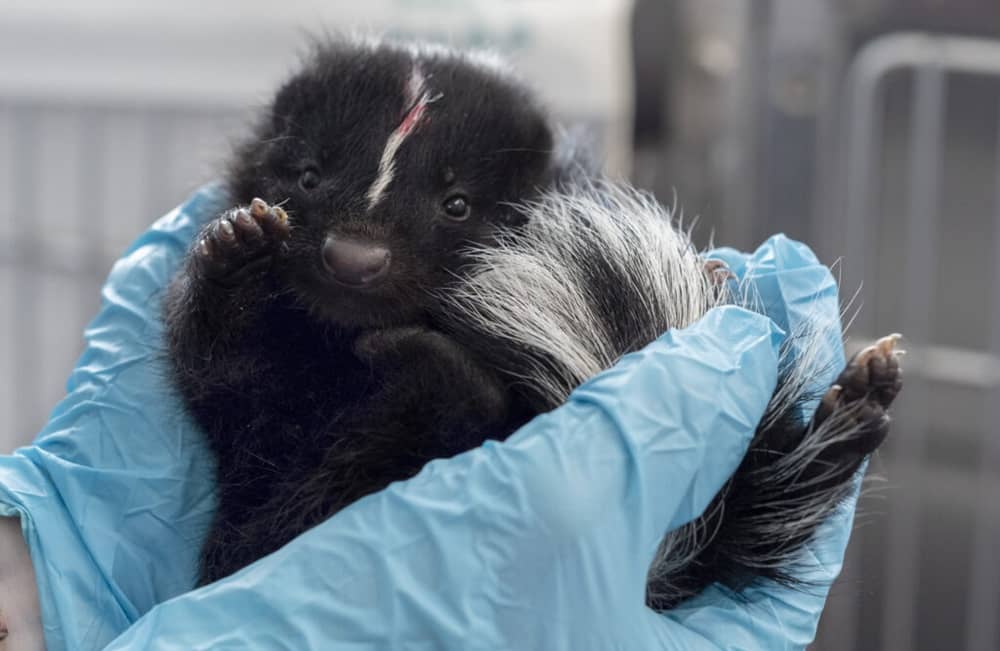
They need proper care and socialization for their development. Only seasoned people should try breeding skunks since it necessitates a thorough understanding of their needs and behavior. The health and wellbeing of the parents as well as the offspring is dependent on ethical breeding methods and following legal practices.
Pros and Cons of Keeping Skunks as Pets
Pros
- Unusual Companionship: Unlike more typical home animals like cats and dogs, skunks make unique pets. They are fascinating companions because of their distinctive traits and ways of being. Skunks that have been socialized appropriately can be incredibly loving, clinging to their owners for attention and relishing intimate moments together. This may establish a fulfilling relationship that sets this pet apart from others.
- Skunks are gregarious, inquisitive animals: They enjoy playing with toys, exploring their surroundings, and having interactive games with their owners. They are amusing pets that may fill a home with joy and laughter because of their playful attitude.
- Bonding: Skunks are able to develop close relationships with their owners, frequently exhibiting canine-like levels of devotion and affection. They become tame and learn to love being handled and petted with consistent handling and pleasant interactions. Those who own pets and like spending time with them may find great fulfillment in this tight attachment.
Cons:
- Lawful Concerns: In the United States, having a skunk as a pet is lawful in a wide range of states and localities. Skunk ownership is completely forbidden in some places, while special permits or rigorous controls are needed in others. In order to make sure they are in compliance with rules, potential skunk owners must do extensive study on local legislation and secure any required permits.
- Specialized Care: Some pet owners may find it difficult to comply with the strict diet and care requirements that skunks require. To avoid nutritional deficits, their food must be well-balanced and comprise a range of fruits, vegetables, and proteins. Skunks also require a safe and stimulating habitat, which includes lots of room for exploration and mental stimulation, in order to flourish.
- Possibility of Odor: Skunks may still have a natural musky smell even after being de-scented, which is a typical practice for pets. Although not as strong as their defense spray, some people find its smell offensive. It takes routine cleaning of their living area and good grooming techniques to control this smell.
- Destructive Behavior: Skunks gnaw on or burrow into furniture, carpets, and other home things due to their strong digging impulses and curiosity. When left unsupervised and untrained, skunks can be disruptive and harm a home. To reduce these behaviors, provide them with suitable toys and ways to release their energy.
Related Species
Earlier skunks were considered from Mustelid families such as ferrets and weasels due to scent glands and short and stout bodies. Now it has its own family Mephitidae which means stink.
- Hooded Skunk (Mephitis macroura)
- Western Spotted Skunk (Spilogale gracilis)
- American Hog-nosed Skunk (Conepatus leuconotus)
Where to Buy
One should never take a skunk from the wild. You should always look for authentic breeders certified or approach Licensed Animal shelters. You should first have a permit to buy or adopt a skunk otherwise you can not own it legally. There are certain animal rescue organizations to be approached for ethical adoption and care. There are certain websites that provide valuable information for the skunk’s availability.
You may have to spend $50 to $500 for a young skunk with some additional amount for spaying or neutering.
Upkeep Cost
You can expect to spend $300 to $500 annually on food, bedding, and basic care. Veterinary costs can vary, so budget for regular checkups and potential emergencies.
Interesting Facts About Skunks
- Skunks are curious creatures that explore every corner of their surroundings and open drawers, cupboards, and refrigerators.
- At times, they will steal a towel, blanket, or cloth to make their bedding more comfortable.
- They have excellent sense of smell and hearing but very poor vision.
- They can’t see an object more than 3 m therefore they are more vulnerable to being hit by car accidents.
- Skunks can spray up to 10 feet accurately. They have a high degree of control over their spray not only in terms of directional aim but also in amount as well. They can shoot a concentrated stream, release a mist to engulf predators, or even spray from one or both the scent glands.
- Their spray contains sulfur compounds that can cause temporary blindness.
- It takes around 10 to 12 days to replenish their stinky supply.
- Odor can be detected by a human nose up to 5.6Km.
- In 1993, American chemist Paul Krebaum developed a compound that chemically neutralizes skunk spray.
- They perform a “ handstand dance” and try to intimidate their enemies with dance moves.
- Skunks can run up to 10 miles per hour.
- Skunks are immune to snake venom.
- Baby skunks (kits) are born blind and deaf.
- They use their claws to dig for food.
- They communicate through sounds and body language.
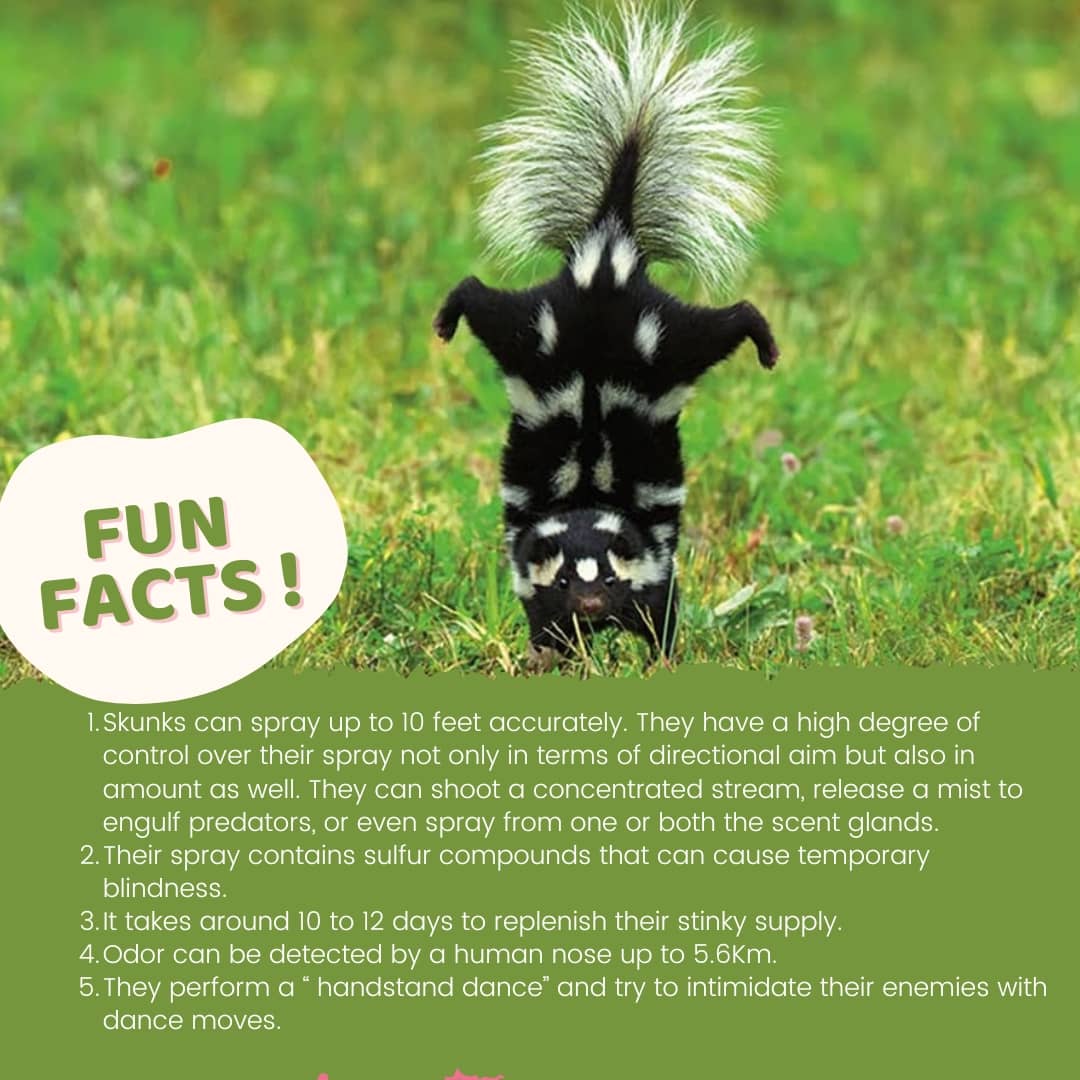
Frequently Asked Questions
Question1. Do Skunks make good pets for children?
Answer: They need a lot of care and attention. Skunks are affectionate and intelligent pets for the owners who offer the proper care.
Question2. Is it legal to own a skunk?
Answer:. It varies by state. Check local regulations before acquiring a skunk.
Question 3. Can skunks be litter-trained?
Answer: It is possible to successfully litter train by using consistent training techniques and rewarding behavior.
Question 4. Do Skunks bite?
Answer: They can, especially if frightened or provoked, but proper socialization reduces this risk.
Question 5. Do Skunks pose any threat to humans?
Answer: Skunks are the main rabies carriers in the US and represent a major threat to people and their animals.
Question 6. How often should I take my skunk to the vet?
Answer:. At least once a year for regular checkups.
Question 7. What kind of toys do skunks like?
Answer: They enjoy digging and love to spend time outside the cage. Ropes and chewing toys can give them some kind of mental stimulation..
Question 8. Do skunks need to be de-scented?
Answer: Yes, pet skunks are typically de-scented to remove their scent glands. They do have a strong smell.
Question 9. Are Skunks noisy?
Answer: They use a variety of vocalizations such as hisses, chirps, and whines, and make funny noises when they are frustrated.
Question 10. How does Skunk spray affect humans?
Answer: Besides the odor, it can create vomiting, nausea, or breathing issues. If spray enters the mouth, the person may experience diarrhea. If it goes in the eyes, it can cause a temporary blindness.
Conclusion:
For those who are prepared to devote the necessary time, energy, and finances to their upkeep, skunks can be interesting and entertaining pets. Potential skunk owners may guarantee a healthy and happy life for their unusual friends by being aware of their needs, behavior, and the difficulties associated with having one. Make sure you do your homework and speak with experts before introducing a skunk into your house.

